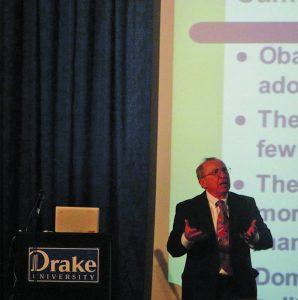
Iowa State professor James McCormick addressed President Barack Obama’s foreign policy from an array of angles at Drake on Monday night, encompassing everything from environmental actions to the U.S. military’s killing of Osama bin Laden.
McCormick, a professor and chair of the university’s department of political science, was the feature speaker for this week’s Fall 2011 Speaker and Film Series, which is presented by the Principal Financial Group Center for Global Citizenship.
According to the group’s director, David Skidmore, McCormick is “a leading scholar on American foreign policy,” making him an ideal speaker for this year’s series.
The fall portion of the series, which includes roughly 40 events each year, focuses on the United States’ global role in public policy. McCormick’s presentation “Barack Obama: A Foreign Policy of Change?” featured a formal lecture session followed by questions for the audience.
“This is part of our mission to educate the campus and community about global affairs,” said Skidmore, a professor of politics and international relations.
To begin the lecture, McCormick elaborated on the differences between the foreign policy of the George W. Bush and Obama administrations. He paid special attention to Obama’s liberal internationalism style of policy change. Obama’s approach to foreign policy, he said, is driven by domestic values, the promotion of democracy, individual rights and a global leadership position for the U.S.
McCormick also connected foreign policy to recent occurrences that will likely resonate in discussion of the Obama administration well after his presidency.
Detailing the effects of the U.S. military’s killings of bin Laden in Afghanistan and Anwar al-Awlaki in Yemen, McCormick asserted that even though these events are of global importance, they did little to affect foreign policy and produced only a temporary increase in the president’s ratings, which now rest at a 42 percent approval from the American public.
Likewise, McCormick said that Obama is more popular overseas than he is in his home nation, raising questions of how he will handle foreign policy during the remainder of his term in office. That term, according to McCormick, has resulted in less change than Americans hoped for.
“The substance of policy has changed in a few limited areas, far less than promised,” McCormick said during the presentation.
McCormick said another important aspect of foreign policy is image, an idea stemming from Obama’s attractive persona as a politician.
“We don’t make policy on the basis of image,” McCormick said. “Image is not enough.”
However, he added that policy is a reflection of American values.
McCormick also questioned Obama’s proposal for the removal of all U.S. troops in Iraq by the end of 2011.
McCormick also listed a number of Obama’s major triumphs as president, including the resurrection of relations with Russia, the New Strategic Arms Reduction Treaty signed in April 2010, the cap-and-trade legislation for global climate change and the country’s new nuclear use policy. Obama’s foreign policy aspirations, McCormick said, have proved far more challenging than expected, partially due to today’s economic agenda dominating the foreign policy agenda.
The Fall 2011 Speaker and Film Series continues on Monday with a presentation by Brian Fishman called “Combatting Terrorism: Lessons Learned.” The lecture will be held in Bulldog Theater in the basement of Olmsted.






